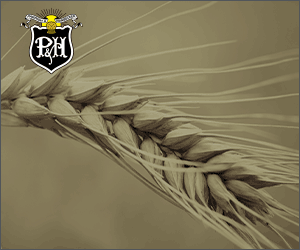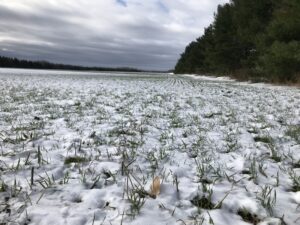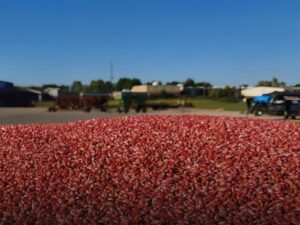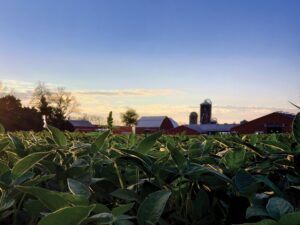Body, mind and soul
Make wellness a priority this harvest season
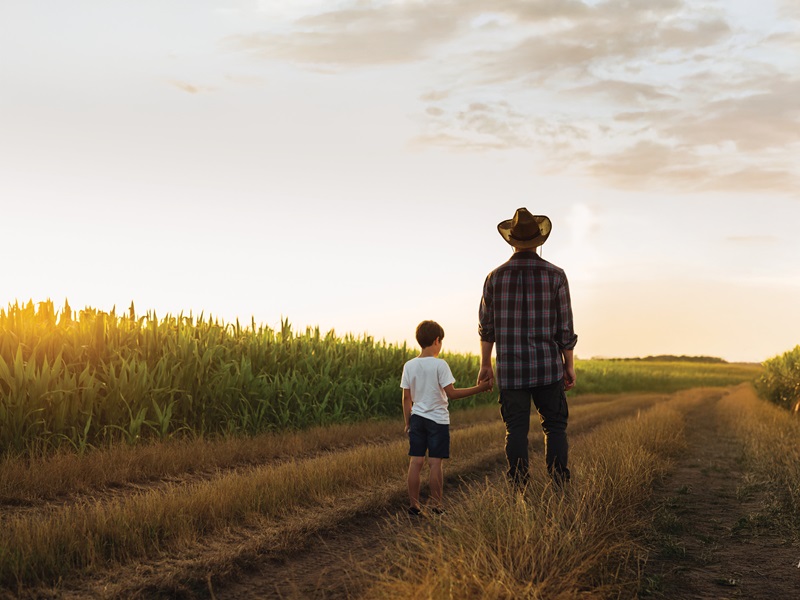
Working well into the middle of the night during busy seasons used to be common for Josh Boersen, a Perth County-area farmer and Grain Farmers of Ontario director of District 9 (Perth). That is, until one fateful night when fatigue caught up with him.
“It was quite wet, and we were behind, just starting to get into late May for planting, and I always made a bit of a habit of working late when it was necessary, sometimes maybe more late than I should have,” he says. “Whatever time it was, I said to myself, I’m just kind of gassed at this point. I need to go home. So, I started to make my way home, but I never quite made it.”
The fatigue overcame him, and Boersen hit a maple tree on the side of the road, at “a reasonably high speed,” which caused significant damage to the tractor and implements.
“We weren’t able to use them for the rest of that spring,” he says. “It was an eye- opening experience.”
Being short on sleep can have a drastic impact on your health and can lead to serious injury or even death, says Seaforth- area family physician, Dr. Heather Percival.
“After about 18-24 hours of being up, you find that your judgment is impaired, but even more importantly, the frustration factor goes way up, and then you become more impulsive.”
Percival points to research that shows that being tired can impact a person as much as drinking alcohol or smoking a joint: being awake for 17 hours is similar to having a blood alcohol concentration of 0.05 per cent; at 24 hours, that goes up to 0.1 per cent. That’s equivalent to blood alcohol concentration levels (0.05 to 0.08) that would result in charges for someone driving on Ontario roads.
Percival, who grew up on a farm in Bruce County and currently treats many farmers in her Huron County practice, understands the nature of farm businesses and the stress that comes with the job, with so much outside of a farmer’s control, including the weather, but cautions that farmers shouldn’t push the limit on sleep.
“The witching hour—three to six in the morning—that’s when accidents happen,” she says. “[Lack of sleep] is a recipe for making mistakes, cutting corners, which invariably end up not going well.”
That ‘witching hour’ is when Boersen’s farm accident occurred, and he describes it as the time of day when “nothing good happens, especially when you’ve been up and working all day.” While he fortunately wasn’t injured in the farm accident, he says the outcome was not worth the extra 50 acres or so of planting that he got done.
“From then on, I made a policy that we’re going to stop at about 11 o’clock at night and call it a day, and I will get up at four or five in the morning and get started again.”
PHYSICAL AND MENTAL HEALTH IMPACTS
Chronic lack of sleep can have negative impacts on a person’s physical and mental well-being, including an increased risk of high blood pressure, heart disease, and significant effects on mental health.
These factors will “significantly impact your ability to do the job over the course of a lifetime,” says Percival.
Lack of sleep is just one of the factors that can impact a farmer’s health during busy periods like planting or harvest. Percival points to heat and sun exposure as two top-of-mind topics for farmers to consider.
“A lot of [farmers] have air-conditioned cabs now, but not everyone does,” she says. “You can get dehydrated just sitting in the cab of a tractor, even with the air conditioning on, partly because you’re in and out of the tractor and the heat shock is almost as bad as being in the heat… dehydration impacts your judgement, which then makes you do stupid things.”
The easiest way to know if you’re dehydrated, says Percival, is by the colour of your urine: if it’s anything other than light yellow, then you need to drink more fluids. She recommends at least a cup of water per hour.
TIPS FOR GOOD SLEEP
- Prioritize sleep: Recognize sleep as a non-negotiable part of your health routine, just like eating well or staying hydrated.
- Create a sleep schedule: When you can, try to go to bed and wake up at the same time every day, even on weekends, to regulate your body’s internal clock.
- Optimize your sleep environment: Ensure your bedroom is dark, quiet, and cool. Consider using blackout curtains, earplugs, or a white noise machine if needed.
- Limit caffeine and screen time: Avoid consuming caffeine late in the day and reduce exposure to screens (phones, tablets, computers) at least an hour before bed.
- Take short naps: If you’re unable to get enough sleep at night, consider taking a short nap (20-30 minutes) during the day to help recharge.
- Seek help if needed: If you’re struggling with persistent sleep problems, consult a healthcare professional for advice and possible treatment options.
Source: DoMoreAg Foundation
PUT ON A HAT
Percival says she is seeing more and more farmers in her office with with skin cancers, including melanoma and squamous cell cancer, particularly on their ears, lower arms, and hands, due to years of sun exposure and sunburns.
“As soon as you get one red, first-degree sunburn, that increases your risk for skin cancer 20 years down the road.”
Farmers tend to wear ball caps, which protect the scalp and can offer shade on the face, but offer zero protection against the sun on the ears. She encourages people who spend a significant amount of time outside to wear a wide-brimmed hat.
“Sun exposure isn’t something they think about in their invincible youth,” she says. “They never think about it until they are in their 50s and 60s in my office, and I’m telling them that the tip of their ear needs to come off [due to skin cancer].”
DON’T IGNORE SYMPTOMS
It’s quite common for farmers to put off going to the doctor, says Percival, but there are some symptoms that farmers shouldn’t ignore, even during busy times of the year.
“A lot of farmers think of themselves as invincible. They say, ‘No, no, no, I’ll be fine…let me just finish this field, it’s going to rain in four hours.’”
Pain that doesn’t go away with Advil or Tylenol, shortness of breath, dizziness, and light-headedness that persist after drinking some water are symptoms that should be addressed right away.
“I just had one farmer that came in who said, ‘I just feel a little off,’” she says. “He was having a significant heart attack…his only symptom was that he was kind of dizzy and felt off.”
Percival also recommends that farmers review their medications with their doctor or pharmacist before operating large equipment. It’s not just drugs that cause sedation that are an issue, but also diabetes, blood pressure, and heart medications that can cause problems.
“There are a lot of medications, especially for those in the 50-plus age group, that are a diuretic…and that triples your risk of dehydration,” she says. “Or heart medicines that are designed to slow down your heart and take the stress off your heart—if you’re in a high stress situation and you’re on medication that’s not giving you that adrenaline rush, you’re going to faint.”
Over-the-counter medications and drug interactions should also be discussed with a doctor or pharmacist before operating heavy equipment, as well.
TAKE A BREAK
Percival recommends that everyone take a break during the day—a chance to rest, eat, and connect with family and co-workers.
“I remember growing up, my grandmother made a big mid-day meal, and everyone stopped for an hour for a good meal.”
On Boersen’s farm, they try to do just that each evening during busy periods, gathering in the field, when possible, to have a break, eat supper, and check in on their day and discuss the game plan for what comes next.
Prioritizing family time is also something that he says has become more important and contributes to his well-being during spring planting and harvest.
“This summer during wheat harvest, my extended family had a family reunion, and it was going to be on a Saturday, and my brother-in-law had a wedding [to attend] on Friday night. So instead of trying to hammer everything in there and push everything hard, we just said, ‘Well, we’re just going to take a break, we’ll see what Monday brings,’ and actually take the weekend off. In the past, I probably wouldn’t have done that, probably would have pushed on.” •


